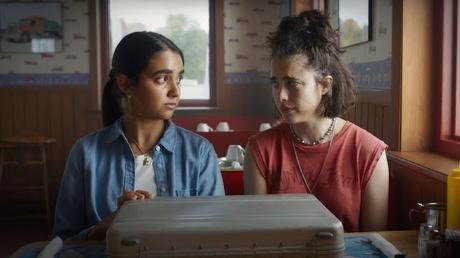
In the 2007 comedy Itty Titty Bitty Committee by Jamie Babbit, a group of feminist activists disappointed by their lack of reach (in a devastating scene, they realize all the page views on their website are from people in the room) and the conservatism of establishment feminism (as represented by one of the main character’s partners, played by Guinevere Turner), plot to blow up the Washington Monument, which they regard as a phallic symbol for the patriarchy. In the context of Babbit’s career as a film director (she is an extremely prolific television director, who also worked as a director and producer on Ryan Murphy’s pre-Glee show Popular, which shares many of Babbit’s aesthetic quirks and returning actors), Itty Bitty followed 2005’s The Quiet, which was a serious departure from the much more famous and very much cherished But I’m a Cheerleader in 1999. I think it’s also fair to say that it is now mostly forgotten and never reached the fond audience that her first film did – but it was the first thing that came to my mind when I watched Ethan Coen’s (co-written with Coen’s wife, Tricia Cooke) Drive-Away Dolls, a lesbian road movie set in 1999. There’s something about the propulsive quality of the film, its unbridled willingness to be wacky and over-the-top, its abstract and absurd dream sequences (featuring, of all people, a sprite-like Miley Cyrus, giving life advice), that reminded me profoundly of Babbit’s film (or maybe of their shared inspiration from John Waters), and more generally, of that specific type of 1990s-early 2000 queer movie that I spent so much time watching and expanded energy finding in a period where it was a lot more difficult to track films down. Another road-movie lesbian movie that I somehow caught dubbed on television back in the days that this reminds me of is 1995’s The Incredibly True Adventure of Two Girls in Love, a Maria Maggenti film that sent freshly in love Laurel Holloman (very pre-The-L-Word, playing a character that couldn’t be any more different from Tina Kennard) and Nicole Ari Parker (more famous for her stint on Empire – but anecdotally, both actresses appeared in Boogie Nights) on the run from their conservative community, another shenanigans-filled road trip.
I don’t know how much either of these films actually influenced the writing and making of Drive-Away Dolls – as a film, it is just as much recognisable as a typical Coen film, even if it is lacking the involvement of Joel. It also sits comfortably in the more recent tradition of female buddy comedies, even if it is set in a different time period – there are echoes of Olivia Wilde’s Booksmart, and Natalie Morales’ Plan B. But I’m not sure if the film had felt as emotionally resonant for me if it hadn’t made me feel nostalgic for the queer movies that I raised myself on, both in terms of the general energy of what was happening on screen and the endlessly entertaining game of recognising a plethora of actors from other things they have done (always a fun game to play with Jamie Babbit’s oeuvre). The production history of the film, which begins in 2007, makes for an interesting read, especially in terms of names that were previously attached to the project (Selma Blair and Chloë Sevigny, which feels very early-to-mid 2000s).
Drive-Away Dolls follows best friends Jamie (Margaret Qualley, who is having some kind of year) and Marian (Geraldine Viswanathan, from Blockers, Bad Education and Australian crime drama Janet King), who are trying to get to Tallahassee on the cheap and accidentally end up driving a car that contains dangerous cargo. They soon are chased by a trio of criminals eager to retrieve what’s in the trunk, but Jamie’s determination to hit up every lesbian bar on the way (or even a bit out of the way) makes the chase difficult. Jamie, who has just gotten out of a relationship (via cheating) with cop girlfriend Sukie (played by a great Beanie Feldstein) and lost her home in the process, and is trying to get Marian, who spends the trip trying to evade questions and reading Henry James’ The Europeans, to loosen up. Of course, they realize that they’ve been in love this whole time in the process, and of course, the “dangerous cargo” is a collection of dildos based on the penises of powerful public figures, one of which is played by Matt Damon (it’s a Coen film!). And there’s the severed head of Pedro Pascal (also currently at the peak of his career but appearing in the film more as a Drew Barrymore in Scream-esque role), resting on a bed of dry ice.
Drive-Away Dolls seems made with sheer entertainment in mind. It is frequently absurd – every character on the edge of the story is interesting and strange – and yet also manages a heartfelt earnestness in its portrayal of the friends-to-lovers romance that is deeply surprising (it works in spite of Qualley’s Texan accent). It somehow manages to perfectly embrace the aesthetic of the year it’s set in – and much of it wouldn’t work if the writing had to factor in the internet. There’s also a genuine sense here of refusing the realities of 1999 – Qualley’s Jamie is openly, joyously and unapologetically queer, and somehow this never leads to situations that are dangerous because of her openness (like asking a hotel concierge directions to the nearest lesbian bar), which gives the film almost an utopian quality for the time period it is set in, and the places the two leads go to. It viscerally feels like a film in which everyone involved had a great time – and that translates to the audience. This isn’t high art – or High Art (1998, Lisa Cholodenko), and that’s just fine.
2024, directed by Ethan Coen, starring Margaret Qualley, Geraldine Viswanathan, Beanie Feldstein, Joey Slotnick, C.K. Wilson, Colman Domingo, Pedro Pascal, Bill Camp.

